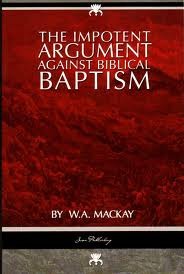| Why Children of Believing Parents Can Receive the Sign of the Spirit: If the sign of baptism is immersion and given based on our profession alone, then infants should not be baptized. But if, as I have made the case above, the sign of baptism is moreso a sign of what God is to do to us and for us through his Spirit, then it seems quite appropriate to baptize the children of believers. Children of believers have been given the mark of God before faith since the time of Abraham, but they were only ever given the mark because of faith - the faith of their parents. The Psalmist discusses in several places his connection to God from childhood or before his birth. Paul says that he was set apart by God even before he was born (Galatians 1), and says that all believers were chosen in God before the foundation of the world (Ephesians 1). The idea of God's covenant with us and his salvation unto us as being done at a moment in time is true from a particular perspective, but God's promise and his call on us, while not effected until later in our lives, is placed upon us from even before our birth. It makes sense, as with circumcision, to mark the children of believers - children for whom God's covenant holds true, and for whom their faith should be anticipated and expected. In their own right, children of believers are set apart because they join in the visible community of God, at least for a time, even if they eventually apostatize or never come to true faith. |
- Many credobaptists get hung up on the idea that infants don't have faith yet and therefore their standing shouldn't be considered differently than any other nonbeliever. They understand that God gave circumcision to infants in the OT despite their lack of faith, though faith was necessary even then for salvation. But what is really cool is that God, in the NT, makes very clear that he views the children of his people differently. His view has not changed from the OT. In I Corinthians 7:14 we see Paul say, "For the unbelieving husband has been sanctified through his wife, and the unbelieving wife has been sanctified through her believing husband. Otherwise your children would be unclean, but as it is, they are holy." The children of at least one believing parent are considered as set apart and distinct because their parent represents them before God. As Peter said to the crowd who were to be baptized, this is a promise to you and your children. This makes a lot of sense theologically. If Adam represented all of humanity, showing us what we all would have done if given the same opportunity, then we are all guilty. Unless you ascribe to the heresy of Pelagianism and don't believe that we are born in sin, then you believe we are born in a particular manner based at least in part on the one who has represented us before God (Adam). We are born in a different state than Adam was created because of Adam's actions and our descent from him.
In some ways this doesn't seem quite fair to most of us, as we didn't commit the sin of Adam. Yet we were in Adam. We come from Adam. And because of this - because of the fall - before anyone is born we can already be 100% confident that they will live a life of choosing evil. It is who we are. While this guilt in Adam is an unfortunate truth, federal headship (our actual standing due to our representative's standing) is also awesome because though through one man (Adam) we are all sinners, this representation allows us all to be redeemed through one man (Christ). Were any of us placed in Adam's position, we would have sinned, so to be represented by Adam looks beautiful to me. Why? Because federal headship, or representation, is vital to our salvation and is one of the ways in which God works. If representation on our behalf would not function in Adam unto sin, how could it function in Christ unto righteousness? If God had a system that could only ever view us based on our individual merits and not through representation, how could any be saved without a representative if we all would have sinned on our own anyway?
Knowing what I know, that God tends to work through families and he sets them apart (sanctifies, consecrates, etc), knowing that God calls the children of his children "clean" and "holy," and knowing that my God is powerful to initiate and save, I trust that my children have been called to him even now, should they die before faith is possible. If the Spirit could cause John the Baptist to leap in his mother's womb, surely he can work in my children. I am not reliant on my child's faith to save them. If I were, what children who died could be saved? Rather, I am reliant on God's mighty hand to seek and save the lost, in whatever condition those lost may be. And if my children do live to see a day where they have the capacity to place their trust in God, I trust that God will effectively call them to a faith in him.
PREVIOUS: Part 2: Sprinkling and Consecration NEXT: Part 4: Contextual Evidence





 RSS Feed
RSS Feed